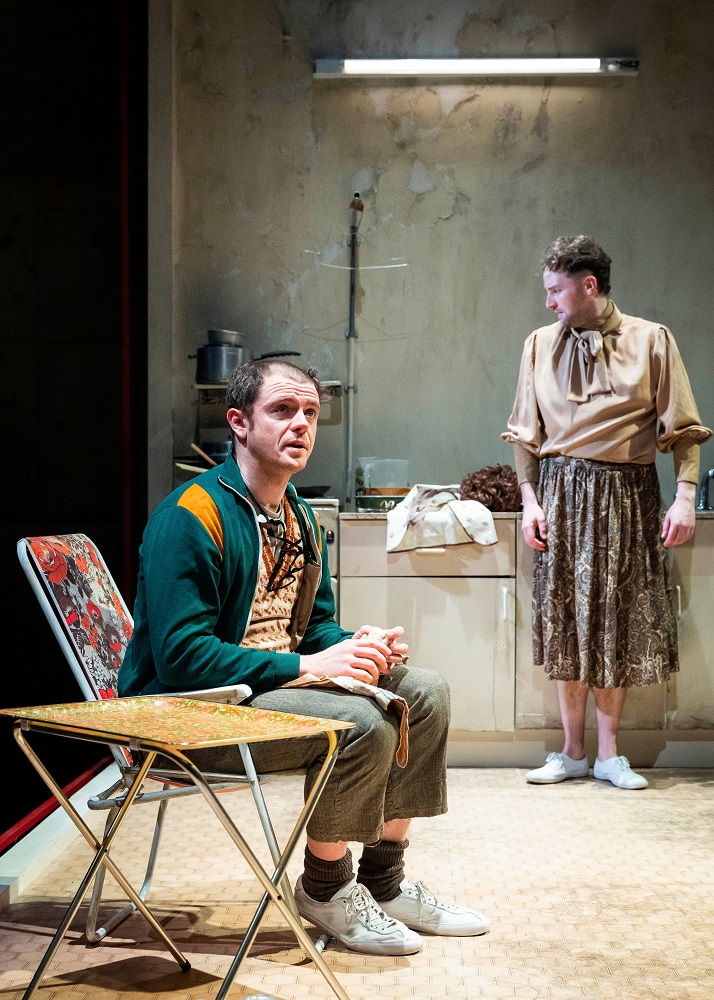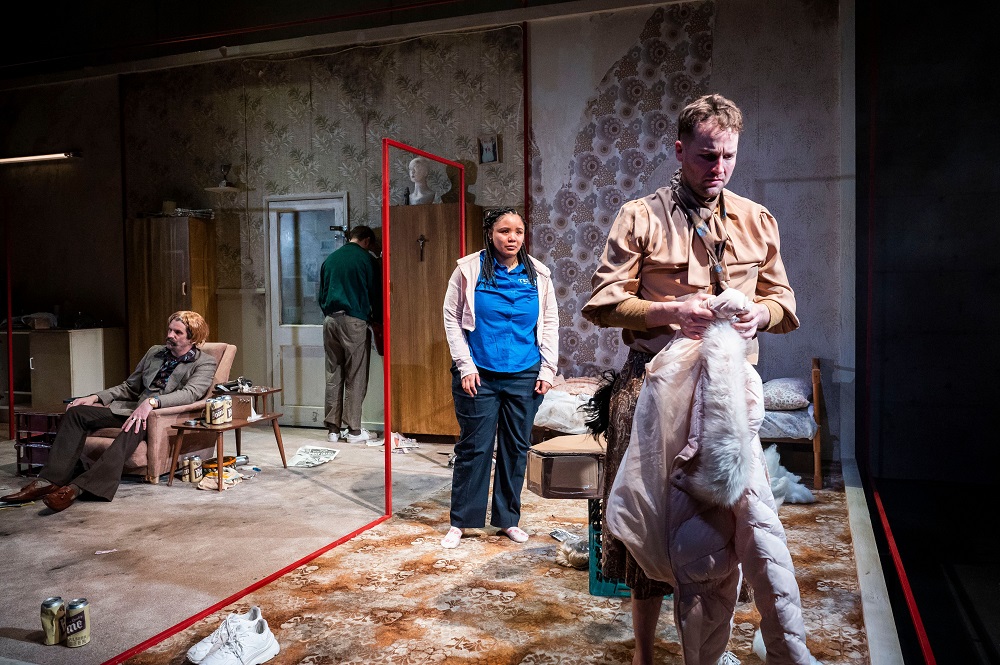The farce in question is fast and furious, but not often hilariously funny; that’s because it’s the invention of a scary Irish dad who forces his sons to act it out with him every day in their seedy Walworth Road flat. Go with conventional expectations and you’ll be wrong-footed, or downright disappointed; Enda Walsh pushes boundaries, pulls the dirty rug from under our feet. Vividly acted, directed and designed, this revival of his 2006 two-acter suggests it’s a masterpiece.
It helps not to know what lies in store, which heightens the thriller aspect of the play; I was a nervy virgin encountering the brilliantly-crafted plotline for the first time, although I could have seen The Walworth Farce in the production of Ireland's Druid Company at the National Theatre in 2008, and would love to have caught the disconcerting novelty of three Gleesons, father and sons, playing a (hopefully) more dysfunctional family at Dublin’s Olympia Theatre.
 No matter; the potency of the venue – this is the first major production at Southwark Playhouse’s excellent and well-designed second theatre, the Elephant – being so close to the putative setting of the play marks a further messing with one’s head in terms of where reality ends and fantasy takes over. I'm sure I read somewhere of the McDonagh brothers’ similarly (if, praise the lord not equally) difficult upbringing in Elephant and Castle, which must have been a starting-point for Walsh’s imaginative flights. They, at least, got to see their mother in Ireland every summer; for Walsh's Blake and Sean, there’s been no escape since they were brought to London at an early age. Their, and father Dinnny’s, plaint for Cork is even more desperate than the longing for Moscow of Chekhov’s three sisters.
No matter; the potency of the venue – this is the first major production at Southwark Playhouse’s excellent and well-designed second theatre, the Elephant – being so close to the putative setting of the play marks a further messing with one’s head in terms of where reality ends and fantasy takes over. I'm sure I read somewhere of the McDonagh brothers’ similarly (if, praise the lord not equally) difficult upbringing in Elephant and Castle, which must have been a starting-point for Walsh’s imaginative flights. They, at least, got to see their mother in Ireland every summer; for Walsh's Blake and Sean, there’s been no escape since they were brought to London at an early age. Their, and father Dinnny’s, plaint for Cork is even more desperate than the longing for Moscow of Chekhov’s three sisters.
Anisha Fields’ superb set design, realistically detailed – though there are suggested red door frames separating kitchen, living room and bedroom – turns out to be strikingly at odds with Walsh’s brand of theatre about theatre (in a programme interview, he mocks a critic’s comment to the effect that “surely social services would have been on to that family years ago”). And while the songs on the radio are essential, it's admirabe that Joseff Harris's soundscape is so selective and discreet. The “untruths and myth” these Irish men tell each other hold up a mirror generally to the lies we weave without even meaning to, and specifically to Irish tale-telling. Dinny’s often surreal family drama seems to come from the world of Flann O’Brien, who mocked Irish nostalgia, romance and (more dodgily) extreme poverty in his very disconcerting novel The Poor Mouth.  While one can imagine three different actors playing the “farce” for more madcap laughs – it may be part of the point that it gets a bit monotonous halfway through the first act – these performers pull out all other stops under the clever direction of Nicky Allpress. Killian Coyle’s imprisoned Blake poses a threat from the start, while Dan Skinner’s Dinny excels in a quiet monologue where he drops the psychosis and the play-acting; better still is the one from lynchpin Sean as delivered by the utterly compelling Emmet Byrne (pictured top with Killian Coyle). When Tesco’s worker Hayley breaks the pattern – or does she? – we surely feel instant sympathy with the warm-hearted chatterer so beautifully conveyed by Rachelle Diedericks (pictured above with Byrne, Skinner and Coyle, and a knot of anxiety for her as she gets trapped in the spiralling madness of the family saga. For that reason the tension of the second act goes up several notches. The denouement does not disappoint: Walsh pulls off his virtuoso tale-telling, and this production supports it to the hilt.
While one can imagine three different actors playing the “farce” for more madcap laughs – it may be part of the point that it gets a bit monotonous halfway through the first act – these performers pull out all other stops under the clever direction of Nicky Allpress. Killian Coyle’s imprisoned Blake poses a threat from the start, while Dan Skinner’s Dinny excels in a quiet monologue where he drops the psychosis and the play-acting; better still is the one from lynchpin Sean as delivered by the utterly compelling Emmet Byrne (pictured top with Killian Coyle). When Tesco’s worker Hayley breaks the pattern – or does she? – we surely feel instant sympathy with the warm-hearted chatterer so beautifully conveyed by Rachelle Diedericks (pictured above with Byrne, Skinner and Coyle, and a knot of anxiety for her as she gets trapped in the spiralling madness of the family saga. For that reason the tension of the second act goes up several notches. The denouement does not disappoint: Walsh pulls off his virtuoso tale-telling, and this production supports it to the hilt.















Add comment